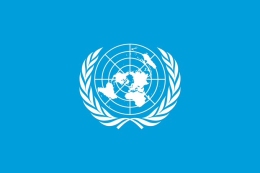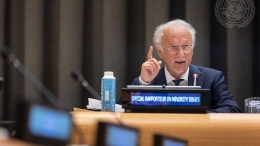The UN Special Rapporteur on Minority Issues is calling on the Spanish State to comment on the compatibility with international law of the rulings of the High Court of Justice of Catalonia (TSJC) against language immersion. The rapporteur has made this request, in a reply that we now publish, to seven civil society organisations (Sine Qua Non, Plataforma per la Llengua, el Sindicat d'Estudiants dels Països Catalans, Fundació Escola Valenciana, Language Rights, USTEC-STEs i la Intersindical-CSC). They joined forces to inform him of the campaign by Spanish courts to end language immersion and impose Spanish as the lingua franca of the Catalan education system.
The report submitted by the rapporteur, still Fernand de Varennes, considers that "reducing the use of the Catalan language in the successful immersion programme in Catalonia would run the risk of children and pupils from Spanish-speaking backgrounds from learning Catalan well, as it is a minority language". Moreover, he stresses that "given that Spanish is the majority language in the country, its daily use and exposure is already privileged and guaranteed". He is also blunt in his criticism of the actions of the judiciary: "It also appears that, in recent years, judicial interpretation and other developments have generally led to an increase in obstacles hampering the use of minority languages in a number of public services". In view of this situation, the rapporteur considers that "there is an issue that requires immediate attention" and calls on the Spanish government to inform the public.
In this response, Varennes recommends that Spain "review and reconsider the rulings of the TSJC that the teaching in Spanish should constitute at least 25% of all teaching in primary and secondary schools in Catalonia. This is to ensure that it is in line with the state's international human rights obligations". He also asks it to provide information regarding the allegations made and to explain how the developments brought to its attention are compatible with the State Government's obligations. He further calls it to explain what measures it intends to take to remedy the incompatibilities of the court decisions with international human rights standards. The rapporteur goes on to request information on the extent to which Catalan students will continue to be taught in Catalan and exposed to the Catalan language to be able to use it in their public life.
In addition, Varennes sought clarification on the legal basis and logic applied by the TSJC to rule against the language immersion model, which is considered a successful model by UNESCO and several international actors. Finally, he asks for an explanation of how the decisions of the TSJC are compatible with international law and international human rights instruments ratified by the State Government itself.
The Rapporteur urged the Spanish government to respond in less than 60 days, but as of today, after this deadline has passed, there is no record of any response from Spain on the UN website. The possible answers will be received by the new Rapporteur on Minorities, the Swiss Nicolas Levrat, who will continue the work of his predecessor in reviewing the role of states in protecting linguistic, national, ethnic and religious minorities.

The UN, concerned about Catalan in Catalan schools, calls for a review of the rulings of the High Court of Justice of Catalonia
The rapporteur denounces that the Spanish Constitution has not been adapted to international instruments and continues to ignore linguistic discrimination.
The Rapporteur also points out that the Spanish Constitution is not in line with international instruments protecting against discrimination. In particular, he cites that Article 14 of the Constitution, on equality before the law, does not include language among the prohibited grounds for discrimination, as it does in the UN Human Rights treaties. This fact could "give rise to concern in terms of the scope it leaves for possible discriminatory practices against linguistic minorities". This fact was already noted in the Report of the Special Rapporteur on Minority Issues published after he visited Spain in January 2019. In the same report, the Rapporteur had already expressed concern about the decisions imposing the use of Spanish in the Catalan education system. This time, with the 2020 ruling imposing the 25% of the Spanish language that affects the entire Catalan education system, he has asked for "clarification of the legal basis and the logic applied by the High Court of Justice of Catalonia to rule against the Catalan immersion model, which has been successfully tested by UNESCO and other international bodies".
The Rapporteur's Communication ends with an appendix of references to international human rights law, which summarises the international instruments and principles that support the system of linguistic immersion and the Catalan language as an instrument for cohesion. These instruments include the 1948 Universal Declaration of Human Rights; the 1990 Convention on the Rights of the Child; the Declaration on the Rights of Persons Belonging to National or Ethnic, Religious and Linguistic Minorities, adopted by consensus on 18 December 1992; the 2020 thematic report to the UN Human Rights Council on "Education, Language and the Human Rights of Minorities"; the Language Rights of Linguistic Minorities: A Practical Guide for the Implementation, a handbook produced by the UN Special Rapporteur on Minority Issues in 2017, or General Comment No. 21 of the Committee on Economic, Social and Cultural Rights.
It also refers to the recommendations and best practices stemming from the outcome documents of the annual UN Forum on Minority Issues, in particular the 12th session of the Forum on "Education, Language and Human Rights of Minorities" on 28-29 November 2019. The report, based on his recommendations, urges states to pursue the goal of linguistic equality through the provision of "education and teaching in minority languages". The recommendations urge states to safeguard mother-tongue education for linguistic minorities at all levels where feasible. More significantly, they urge states to interpret the feasibility of inclusive and multilingual language education policies as favourably as possible for the use of the mother tongue as a medium of instruction".
Fernand de Varennes doesn't cite the instruments of the Council of Europe or the EU for the protection of minorities. In fact, he was already of the opinion that these gave states all the power to decide what was protected and what was not. In this context, he felt that it is essential to achieve the highest possible degree of recognition, such as official recognition at the European level, which will not come during the Spanish EU presidency.





